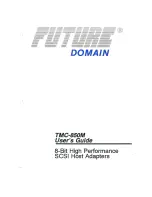
19
cracked in a couple of hours with off-the-shelf tools.
Wireless LAN (WLAN)
A wireless LAN does not use cable to transmit signals, but rather uses
radio or infrared to transmit packets through the air. Radio Frequency
(RF) and infrared are the commonly used types of wireless transmission.
Most wireless LANs use spread spectrum technology. It offers limited
bandwidth, usually under 11Mbps, and users share the bandwidth with
other devices in the spectrum; however, users can operate a spread
spectrum device without licensing from the Federal Communications
Commission (FCC).
Fragment Threshold
The proposed protocol uses the frame fragmentation mechanism defined in
IEEE 802.11 to achieve parallel transmissions. A large data frame is
fragmented into several fragments each of size equal to fragment threshold.
By tuning the fragment threshold value, we can get varying fragment sizes.
The determination of an efficient fragment threshold is an important issue in
this scheme. If the fragment threshold is small, the overlap part of the master
and parallel transmissions is large. This means the spatial reuse ratio of
parallel transmissions is high. In contrast, with a large fragment threshold, the
overlap is small and the spatial reuse ratio is low. However high fragment
threshold leads to low fragment overhead. Hence there is a trade-off between
spatial re-use and fragment overhead.
Fragment threshold is the maximum packet size used for fragmentation.
Packets larger than the size programmed in this field will be fragmented If you
find that your corrupted packets or asymmetric packet reception (all send packets,
for example). You may want to try lowering your fragmentation threshold. This will
cause packets to be broken into smaller fragments. These small fragments, if
corrupted, can be resent faster than a larger fragment. Fragmentation increases
overhead, so you'll want to keep this value as close
to the maximum value as possible.
RTS (Request To Send) Threshold
The RTS threshold is the packet size at which packet transmission is governed
by the RTS/CTS transaction. The IEEE 802.11-1997 standard allows for short
packets to be transmitted without RTS/CTS transactions. Each station can
have a different RTS threshold. RTS/CTS is used when the data packet size
exceeds the defined RTS threshold. With the CSMA/CA transmission



































